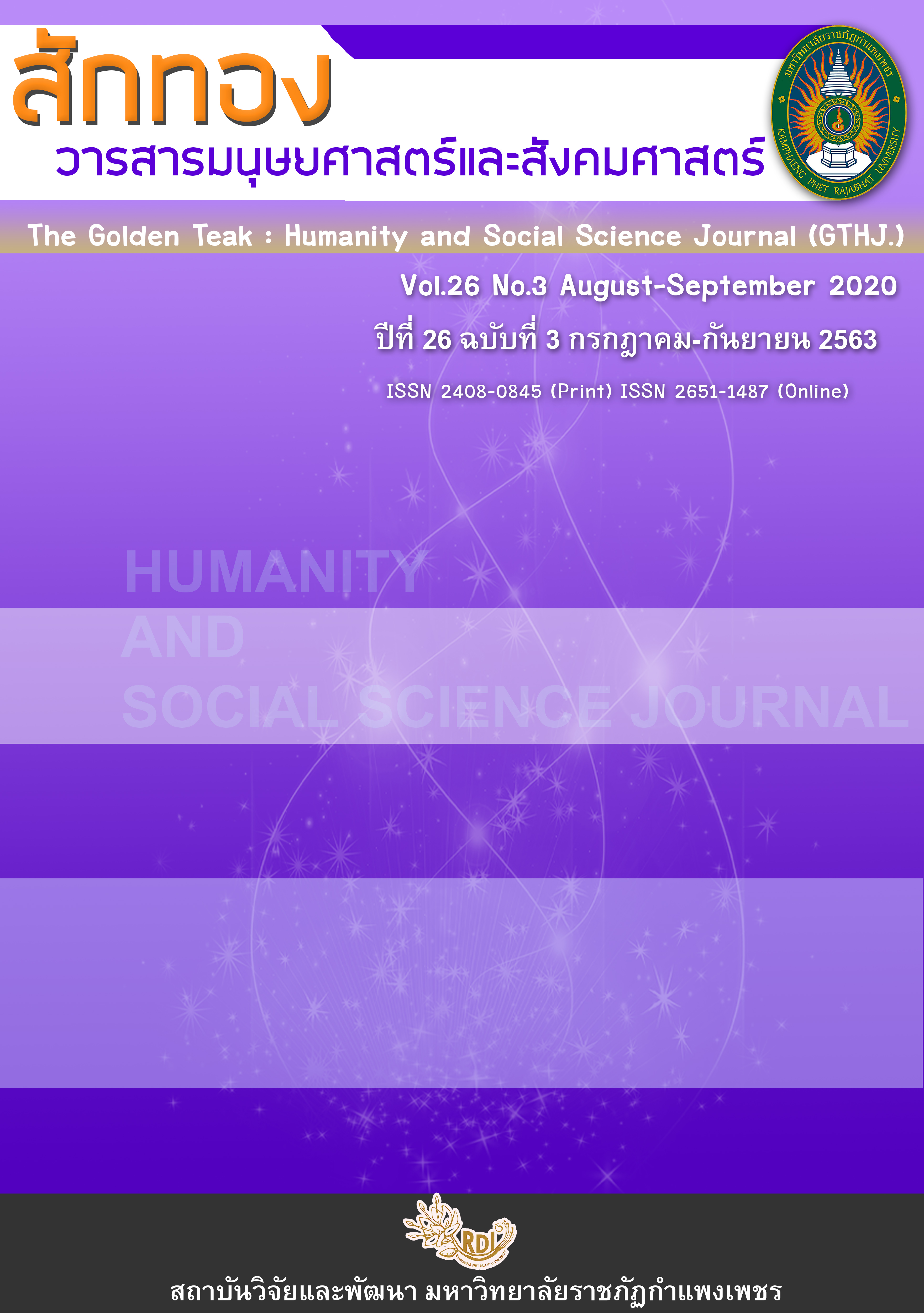Causal Relationship Model of Engagement of Teacher Government Officials Under the Office of Basic Education Commission, Phitsanulok Province
Main Article Content
Abstract
This research aiming to study the causal relationship mode of engagement of teacher government officials under the Office of the Basic Education Commission, Phitsanulok Province. The sample group used in the study consisted of 400 teachers in Phitsanulok province by multistage stage sampling, the academic year 2018. Statistics used in data analysis were mean and standard deviation, and Mplus version 7.11 program was used in Path Analysis. The finding can be summarized as follows. 1. Causal Relationship Model of Engagement of Teachers Under the Office of Basic Education Commission, Phitsanulok Province was consistent with empirical data (Chi-square = 24.367, df - 14, P = 0.0414, CIF = 0.998, LTI = 0.991, SRMR = 0.077, RMSEA = 0.044) 2. Personal factor (PER) had a direct positive influence on Flow at Work (FLOW) and indirectly gave a via Flow at Work (FLOW) to Work Commitment (ENGE). Job (JOB) had a direct positive influence on Flow at Work (FLOW) and indirectly gave a via Flow at Work (FLOW) to Work Commitment (ENGE). Flow at Work (FLOW) had a direct positive influence on Engagement (ENGE).
Article Details

This work is licensed under a Creative Commons Attribution-NonCommercial-NoDerivatives 4.0 International License.
บทความที่ได้รับการตีพิมพ์เป็นลิขสิทธิ์ของวารสาร สักทอง : วารสารมนุษยศาสตร์และสังคมศาสตร์ สถาบันวิจัยและพัฒนา มหาวิทยาลับราชภัฏกำแพงเพชร
ข้อคิดเห็นใดๆ ที่ปรากฎในวารสารเป็นวรรณกรรมของผู้เขียนโดยเฉพาะ ซึ่งมหาวิทยาลัยราชภัฏกำแพงเพชรและบรรณาธิการไม่จำเป็นต้องเห็นด้วย
References
Experiences. Journal of Vocational Behavior, 66, 26-44.
Bakker, A.B. & Demerouti, E. (2008). Towards a model of work engagement. Career
Development International, 13(2). 209-223.
Buaprom, K. (2010). Work Motivation Among High School Teachers under The Suratthani
Education Service area Office. Master’s thesis, Suratthani Rajabhat University.
Changlek, Y. (2010). Work Motivation of Teachers in Thungtako School Cluster under
The Primary Educational Service Area Office 2 Amphoe Thungtako,
Changwat Chumporn. Master’s thesis, Bansomdej Chaopraya Rajabhat University.
Choochom, O., Thanachanun, S. & Thongpakdee, T. (2011). Antecedents and Consequences
of Youths’ Psychological Immunity. Bangkok : Srinakharinwirot University.
Choomjit, Y. (2007). Being a Profession Teacher. (4 th ed.). Bangkok : Odeon Store.
Herzberg, F. (1959). The Motivation to Work. New York : Wiley.
Hrebiniak, L.G. & Alutto, J.A. (1972). Personal and role-related factor in the Development of
organization commitment. Administrative Science Quarterly, 17, 555-562.
Jittieng, S. (2010). Job satisfaction and organizational commitment Among Employees of
CAT Telecom Public Company Limited (Headquarters). Master’s thesis, Krirk
University.
Kivikangas, J.M. (2006). Psychophysiology of flow experience : An explorative study. Thesis,
Department of Psychology, University of Helsinki.
Lertwiboonmongkol, J. (2004). Relationships Between Personal Factors Work empowerment
Achievement Motivation and Work Happiness of Staff Nurses Governmental
University Hospitals. Master’s thesis, Faculty of Nursing Chulalongkorn University.
Menapodthi, R. (2007). Happiness in the Workplace Indicator. Master of Science
(Human Resources Development) National Institute of Development Administration.
Naami, Adboizhra. (2011). Relationship between Person-Environment Fit and Job Engagement
in Nurses of Ahvaz Hospitals. International Journal of Psychology, 5(1), 119-134.
Nakamura, J. & Csikszentmihalyi, M. (2002). The concept of flow. In C.R. Snyder & S.J.
Rasorn, T. (2016). The factor of teacher’s working happiness under the Secondary
Educational Service Area Office 21. Master’s thesis, Udonthani Rajabhat University.
Rongpinit, A. (2012). Development of a causal model of teacher retention with work
engagement as mediator. Master’s thesis, Chulalongkorn University.
Schaufeli, Wilmar B., Bakker, Arnold B. & Salanova, Marisa. (2006). The Measurement of Work
Engagement with a Short Questionnaire: A Cross-National Study. Educational and
Psychological Measurement, 66(4), 701-716.
Steers, R.M. (2007). Organization Effectiveness. (7 th ed.). California : Goodyear Publishers.
Takmatcha, S. (2003). Job motivation of teachers in primary schools under the office of
Rayong provincial primary education. Master’s thesis, Burapha University.
Tawichatanon, P. (2012). The multilevel factors affecting work engagement of officers in
HIV non profit organization. Master’s thesis, Srinakharinwirot University.
Wiriyakitpatana, W. (2013). Proactive Personality, Quality of Work Life and Work
Engagement : A case Study of One Chemical Company in Bangkok. Master’s thesis,
Thammasat University.
Wood, R.E. & Bandura, A. (1989). Social-cognitive theory of organizational Management.
Academy of Management Reviewed, 14.


